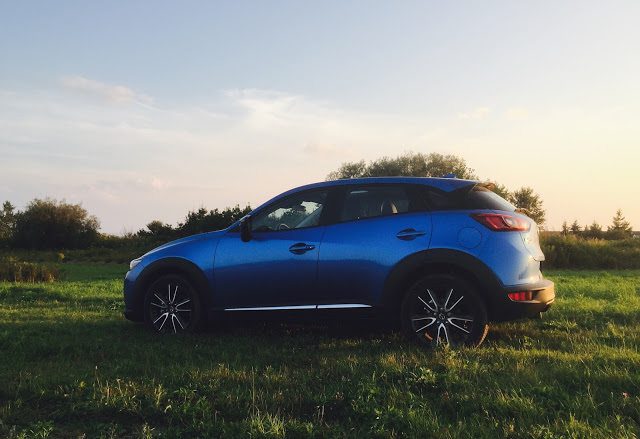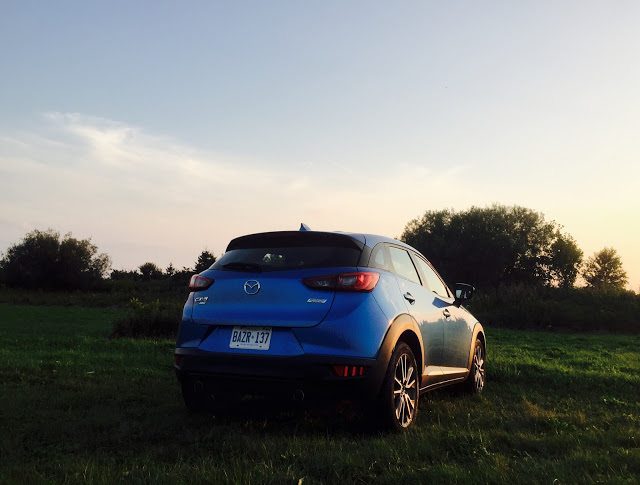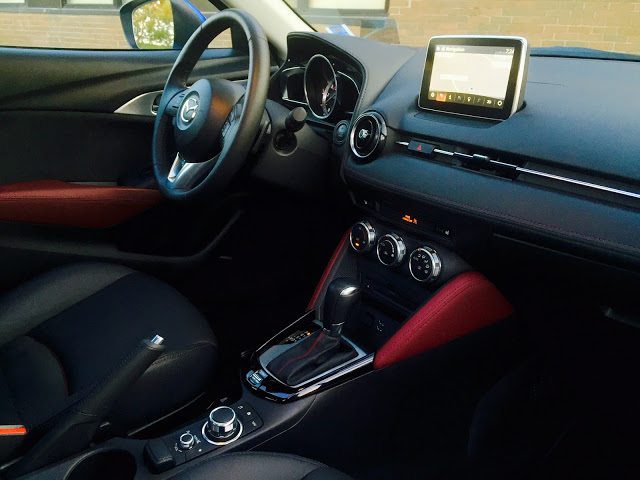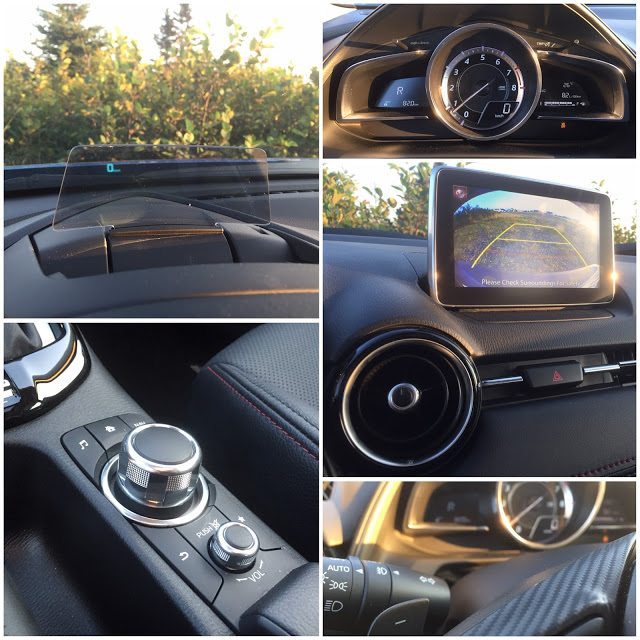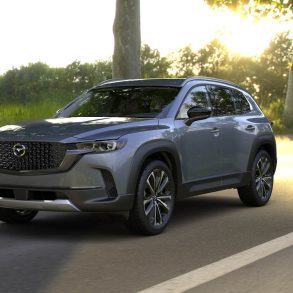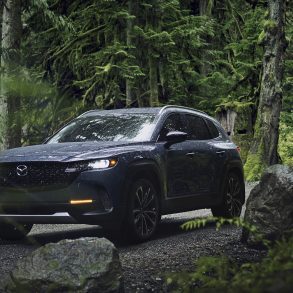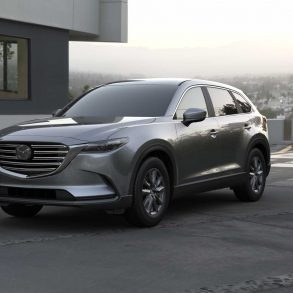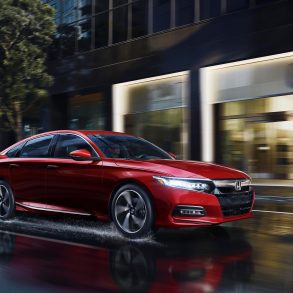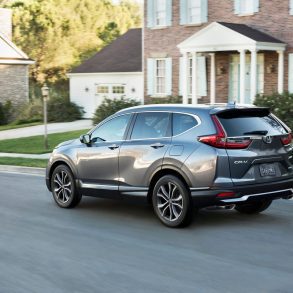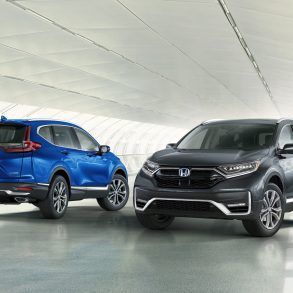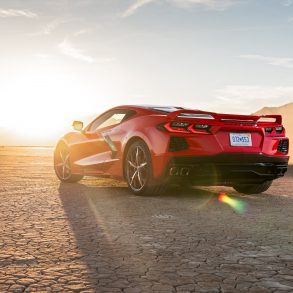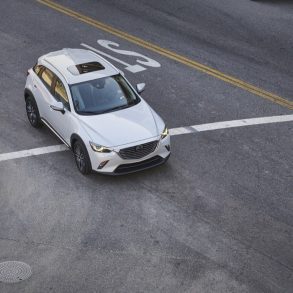This week, we’re testing a 2015 Dodge Charger SXT Rallye AWD, a traditional large family sedan.
The Charger is 58.2 inches tall, measured from driveway to top of roof.
Last week, we were driving the subject of this review, a 2016 Mazda CX-3 GT AWD, allegedly a subcompact SUV. The CX-3 is 60.7 inches tall.
| THE GOOD • Terrific styling • Nimble, athletic, poised chassis • Sufficient power • Smart 6-speed automatic • Intuitive infotainment • Always wants to have fun |
THE BAD
• Buzzy four-cylinder
• Cramped interior
• Rough ride on these big wheels • No manual trans available • Poor real-world fuel economy • Where’s the ride height? |
Did 3,437 Canadians, over the span of just four months, buy or lease a 2016 Mazda CX-3 because they like to sit up high with a commanding view of the road?
No. There is no such height; no such commanding view from the CX-3’s driver seat.
Did 3,437 Canadians buy or lease a 2016 Mazda CX-3 over the last four months because of SUV styling cues and the benefits of all-wheel-drive which these new owners will realize if, come December, their CX-3s are fitted with winter tires? Yes. Definitely, yes.
New CX-3 owners aren’t simply blessed with an attractive car and four-wheel propulsion, of course. The CX-3’s capable chassis, straightforward infotainment unit, and Mazda Canada’s new unlimited mileage warranty combine with the car’s stand-out styling and all-wheel-drive availability to make the CX-3 an entirely different proposition from the Mazda 3 and the new Mazda 2 on which this CX-3 is based.
|
2016 MAZDA CX-3 GT AWD
Base Price: $30,890 * As-Tested Price: $32,390 * Drive Type: all-wheel-drive Transmission: 6-speed automatic Engine: 2.0L DOHC 16-valve I-4
Horsepower: 146 @ 6000 rpm Torque: 146 lb-ft @ 2800 rpm Curb Weight: 2952 pounds
Length: 168.3 inches Width: 69.6 inches Height: 60.9 inches Wheelbase: 101.2 inches Tires: Yokohama Avid S34 Tire Size: 215/50R18 Passenger Volume: 2444 litres Cargo Volume: 408 litres Max. Cargo Volume: 1484 litres EPA City: 27 MPG EPA Highway: 32 MPG NRCAN OEE City: 8.8 L/100km
NRCAN OEE Hwy: 7.3 L/100km Observed: 25.6 mpg Observed: 9.2 L/100km * Canadian dollars, includes $1895 in fees. |
The first-generation CX-3 is slightly difficult to interpret, as are all the other vehicles in its category. They speak a car/SUV dialect with which we’re only beginning to familiarize ourselves.
Like the Nissan Juke, the CX-3 lacks much of the utility that puts the U in SUV.
The SUV styling cues of the CX-3 and Honda HR-V are muted.
As already mentioned, the ride height of the CX-3 and, for example, the Mini Countryman, are barely differentiated, from many traditional small cars.
Ground clearance, at just 6.1 inches for the CX-3 and 5.9 inches for the Mini, is on par with the level of clearance under a Honda Civic sedan.
Not only must the CX-3 and other subcompact SUVs avoid rock hopping, they’re not even capable of curb crawling to get around stationary lines of left-turning traffic.
Nevertheless, the Mazda CX-3 and numerous other subcompact SUVs/crossovers answer a question that tens of thousands of car buyers were apparently asking. The segment’s sales are up 40% to 30,556 units in Canada this year. Subcompact crossover sales are up 69% to 252,310 in the United States through the first eight months of 2015.
Does the CX-3 merit more of your attention than competitors from General Motors, FCA, Honda, Mitsubishi, Mini, Nissan, and Subaru? Or should the Mazda be scratched off your cute-ute/faux-SUV wish list?
WHAT IS IT?
Just as Honda massaged a Honda Fit into a Honda HR-V, Mazda turned their subcompact 2 into the CX-3, a subcompact utility vehicle. (We’re not referring to the 2 that served more than 20,000 Canadians since 2010 but rather the new 2, which won’t come to America and still hasn’t made an appearance in Mazda Canada’s portfolio.) The CX-3, however, takes its powertrain from the basic Mazda 3, although the 2.0L four-cylinder engine makes less horsepower here than in the 3.
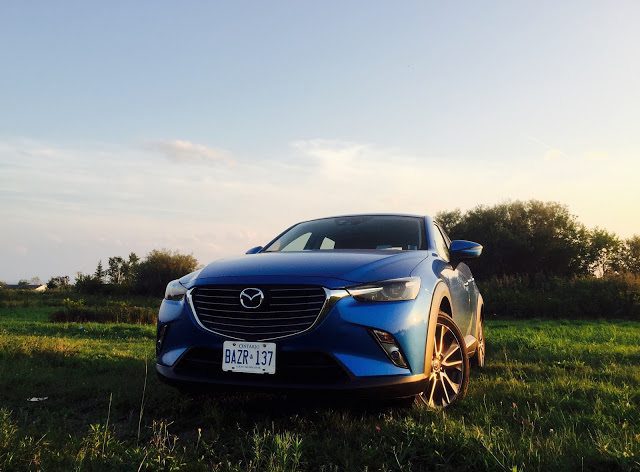 |
| All Photo Credits: Timothy Cain ©www.GoodCarBadCar.net- Click Any Image For A Larger View Photos Shot At The Bob Hilchie Fields In Eastern Passage, Nova Scotia |
The CX-3 sits below the three-row CX-9 and Ford Escape-fighting CX-5 (reviewed here) in Mazda’s SUV/CUV lineup. A basic front-wheel-drive CX-3 costs $245 more than a base automatic-equipped Mazda 3 hatchback and $1000 less than the least expensive automatic-equipped CX-5, which costs $1300 more than the basic manual-shift CX-5.
All CX-3s use a 6-speed automatic – no manual transmission is available. All-wheel-drive is a $2000 option on the GX and GS. All CX-3 GTs send power to the front and rear wheels.
HOW BIG IS IT?
It’s a lot smaller than the Mazda CX-5 and Mazda 3. The 3, Mazda’s best seller, is 7.3 inches longer and an inch wider than the CX-3 with 40% more cargo capacity behind the rear seats. The CX-3 is 10 inches shorter than the CX-5 and five inches lower with four fewer inches of legroom in the rear seat. Maximum cargo volume is 24% greater in the CX-5.
The CX-3 is therefore far from a family car. Squeezing a front-facing child seat into the back didn’t make for a pleasant experience for the passenger in front, nor was fitting the child seat any fun. But the same could be said for most of the CX-3’s competitors. Granted, the CX-3’s interior volume is on the smaller end of the subcompact SUV scale, a trait it shares with the Nissan Juke, the only direct CX-3 rival that can match the Mazda’s athleticism.
| medianet_width=’250′; medianet_height= ‘250’; medianet_crid=’457538086′; |
DOES IT WORK?
Everybody knows that SUVs and crossovers are increasingly car-like. But when driven down your favourite twisty road, they were frightening two decades ago. In the same situation, they became acceptable a decade ago and are now sufficiently capable; sometimes even surprisingly sporty in 2015. Utility vehicles are, nevertheless, let down by their higher centre of gravity.
High centre of gravity? In the CX-3? We’ve already talked about the CX-3’s car-like stature, so you won’t be shocked to discover that the CX-3 offers a typically Mazdaesque set of handling skills.
Quick and accurate steering, limited body roll, and predictable responses make the CX-3 a joy on a winding rural road, the same compliment we would level at the Mazda 3, Mazda 6 and, to a lesser degree, the CX-5 and CX-9. Ride quality is let down by the CX-3’s short wheelbase and, presumably, the big 18-inch wheels of the GT trim.
Historical Monthly & Yearly Mazda CX-3 Sales Figures
2014 Mazda CX-5 GT AWD Driven Review
2014 Mazda 3 Sport GT Driven Review
Meanwhile, even this top-of-the-line CX-3 weighs less than 3000 pounds, so the 146-horsepower 2.0L engine isn’t overmatched. Unfortunately, plenty of buzzy and unrefined noises make their way into the cabin, and the 2.0L runs out of gumption when overtaking at higher speed. The Nissan Juke’s 1.6L turbo would not. Yet in 90% of circumstances, the 2.0L engine is entirely satisfactory and works very well with the quick and smooth-shifting 6-speed automatic transmission. One wonders just how much fun this car might be with a 6-speed manual.
Inside, besides the tight quarters, the CX-3 does present a few remnants of its subcompact car origins. The rear doors clink, they should thunk. Material quality – especially the plastic between the top of the steering wheel and the gauge cluster – isn’t always becoming of a $32K car.
The sense of style is high, however, and Mazda’s HMI – operated through the centre console’s rotary knob and quick access buttons – accomplishes its tasks with aplomb. The system did seem very slow to start up in this CX-3. We were often out of the driveway and around a couple turns before it was ready to switch radio stations or menus.
Our test CX-3 was also equipped with a $1500 Technology Package: blind spot monitoring, rear cross traffic alert, smart city brake support, high beam control, and six months of satellite radio. The final piece of technology in the package, Mazda’s lane departure warning, was completely out of sync with reality. Even in the middle of an especially wide highway lane, the system consistently believed we were veering out of our lane. The buzzing had to stop. We turned it off, just as the previous driver had.
IS ANYONE BUYING IT?
Right from the get-go, the CX-3 has been a Canadian sales success. In its category, only the Honda HR-V is selling more often. More importantly for Mazda, the CX-3 isn’t eating into the CX-5’s slice of the SUV pie. In August, as Mazda Canada sold 906 CX-3s, sales of the CX-5 increased 5% to 2150 units.
Both vehicles, like most of their SUV/crossover competitors, are eating into Canadian car sales volume. Mazda passenger car sales slid 30% in August and are down 18% this year. Industry-wide, Canadian car volume slipped 9% in August and is down 4% this year. Mazda is poised to take advantage of increasing disinterest in passenger cars, as the CX-3 provides an affordable entry point to its SUV lineup and a very natural migration from its small cars.
SHOULD I BUY SOMETHING ELSE INSTEAD?
If space and flexibility matter, you must look elsewhere. The CX-3 is cramped for both passengers and stuff. A top-trim Honda HR-V, undoubtedly not as pretty nor as fun to drive as the CX-3, offers 61% more cargo capacity behind the rear seats; 7% more space with the seats folded.
If this is the type of vehicle you’re after but you still demand engaging dynamics, the crazily-styled Nissan Juke is the most effective CX-3 rival. But the Juke’s more powerful turbocharged engine can be thirsty, and it drinks premium fuel. The Jeep Renegade is the small SUV with off-road chops. If all-wheel-drive isn’t a must-have, the Kia Soul is both enormously spacious and very luxuriously equipped at this price point.
Stepping up a notch in size won’t necessarily mean spending much more money. In fact, you could drive away in a mid-level 2016 Mazda CX-5 GS AWD for $33,270, a powerful 2016 Hyundai Santa Fe Sport 2.0T Premium AWD for $34,467, or a 2016 Ford Escape SE EcoBoost AWD for $29,107 under Ford’s current employee pricing scheme.
GCBC consistently declares that the Mazda 3 hatchback is the best small car for the money. The 3 is worth a look for buyers who don’t require all-wheel-drive, who aren’t keen on the CX-3’s limited space, and who recognize that the CX-3 offers no meaningful ride height advantage.
HOW MUCH SHOULD I PAY?
$32,390 likely pushes past the limits of what a subcompact Mazda crossover should go for in late 2015. Sacrifice some of the high-end safety gear to save $1500, or the safety gear and some other creature comforts to spend $28,220 on the mid-grade CX-3 GS AWD. Then spend another grand or so for optional Mazda wheels. The 16-inchers on the GX and GS make the CX-3 look cheap and unfinished.
Whatever you choose to call the CX-3 – car, SUV, crossover, hatchback – it forces big sacrifices on its owner in the name of fun and style. Spending less than $30,000 on a CX-3 makes those sacrifices easier to swallow, particularly if the degree to which you prioritize fun and style is greater than the degree to which your lifestyle demands flexible family transportation.
We would have been surprised if Mazda didn’t build a CX-3 that was a joy to throw down a serpentine road. We would also be surprised if Mazda’s clientele doesn’t continue to choose the slightly more costly, far more spacious, and still rather enjoyable CX-5 more often than this CX-3.
Timothy Cain is the founder of GoodCarBadCar.net, which obsesses over the free and frequent publication of U.S. and Canadian auto sales figures. Follow on Twitter @goodcarbadcar and on Facebook. The CX-3 was supplied by Mazda Canada’s press office.

